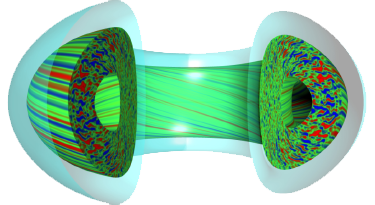Speaker
Description
By means of shortening the execution cost of Gyro-Landau Extended Fluid Code (ExFC), a recurrent neural network (RNN) based surrogate model has been raised to forecast data on the next time step using initial values given by ExFC. The model has been structured as a sequence-to-sequence model which implemented with the well-known Gated Recurrent Unit (GRU) with a residual connection. By using a bucket Min-Max feature scaling technique, a training set is established with the values of all training samples almost equally distributed in [0,1] section. After training, the loss on the training set reaches the order of 10^(-5), while the loss on validation set remains an order higher than that on the training set, implying some overfitting. The prediction given by the model matches considerably well with the original data, where the total relative error of about 10%. Hence the model is capable of fast evaluation of flux and transport level for parameter sweeping during the simulation. On the other hand, in current prediction model performance, turbulent structures have been flattened comparing to the original result, which presumably arises from the lack of potential data during the training of the neural network. A further detailed investigation is still ongoing by means of fully demonstrated turbulence structure.
| Country or International Organisation | China |
|---|---|
| Affiliation | Southwestern Institute of Physics |

